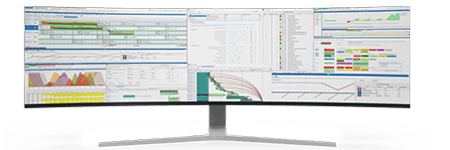Value vs. Quality: Striking the Right Balance in Industrial Manufacturing
In industrial manufacturing, purchasing managers often find themselves at a crossroads between value and quality when sourcing raw materials, components, or services. The delicate balance between these two factors has significant implications for manufacturing operations, influencing everything from production efficiency to product longevity and customer satisfaction. The challenge lies in making informed, data-driven decisions that allow manufacturers to optimize for both value and quality without compromising operational efficiency.
For purchasing managers, the decision-making process is further complicated by fluctuating market dynamics, supply chain disruptions, and evolving customer expectations. An effective solution for tackling these challenges lies in advanced planning and scheduling systems like PlanetTogether, particularly when integrated with robust enterprise resource planning (ERP) systems such as SAP, Oracle, Microsoft, Kinaxis, or Aveva.
This integration provides real-time insights and analytics that enable purchasing managers to make balanced decisions that optimize for both value and quality, ultimately enhancing competitive advantage in the marketplace.

Value vs. Quality in the Context of Industrial Manufacturing
In the manufacturing world, value and quality are often perceived as conflicting priorities. However, understanding the nuances of both can reveal how they can work together to support overall business goals.
Value: This generally refers to the cost-effectiveness of materials or services. In procurement, maximizing value often means finding suppliers who can deliver goods at competitive prices without compromising on essential performance criteria. However, prioritizing value alone can sometimes lead to hidden costs, such as increased maintenance or shorter equipment lifespans, which can impact production efficiency and long-term profitability.
Quality: This refers to the durability, performance, and reliability of materials or services. High-quality components contribute to smoother operations, reduce the need for frequent repairs or replacements, and boost product reliability. However, quality often comes at a higher price point, and overspending on premium materials can erode profit margins if not aligned with production needs.
The key challenge for purchasing managers in industrial manufacturing is to procure materials that strike an optimal balance between cost and quality—maximizing value without compromising product performance.
![]()

How PlanetTogether’s Integration with ERP Systems Transforms Purchasing Decisions
A standalone ERP system offers purchasing managers valuable information on supplier prices, order histories, and procurement workflows. However, when an advanced planning and scheduling solution like PlanetTogether is integrated with an ERP system, the combined power can drive far more informed and impactful purchasing decisions. This integration creates a single, unified data ecosystem that enhances visibility, control, and collaboration across the entire production planning process.
Let’s explore some of the specific ways in which PlanetTogether’s integration with ERP systems like SAP, Oracle, Microsoft, Kinaxis, or Aveva can help purchasing managers achieve the right balance between value and quality.
1. Enhanced Demand Forecasting for Strategic Sourcing
Through its integration with ERP systems, PlanetTogether provides purchasing managers with real-time visibility into production schedules, inventory levels, and demand forecasts. Accurate demand forecasting is crucial for effective sourcing, as it enables purchasing managers to align procurement with actual production needs. By understanding precise demand patterns, managers can negotiate better deals with suppliers, balancing cost with quality requirements without overstocking or risking stockouts.
For example, if demand forecasting indicates a spike in production for a particular component, PlanetTogether can prompt the ERP system to signal a high-priority order, allowing the purchasing manager to source high-quality materials that meet production standards without delays. This proactive approach helps in reducing unnecessary expenses while ensuring that quality standards are upheld.
2. Supplier Performance Insights for Quality Control
The PlanetTogether-ERP integration facilitates the consolidation of supplier performance metrics, enabling purchasing managers to evaluate suppliers not just based on price but also on quality, delivery timelines, and service consistency. These insights allow managers to maintain a list of preferred suppliers who consistently deliver high-quality materials at reasonable prices, reducing the risk of production disruptions due to poor-quality materials or delays.
With integrated data from SAP, Oracle, or Microsoft systems, managers can assess supplier performance trends over time, identifying patterns that might indicate declining quality or increasing costs. This level of analysis is invaluable for making informed decisions that protect both quality and value.
3. Cost-Benefit Analysis for Optimal Purchasing Decisions
When value and quality are in conflict, purchasing managers can leverage PlanetTogether’s capabilities to perform a comprehensive cost-benefit analysis. By analyzing the total cost of ownership (TCO) within the ERP system—taking into account purchase price, operational costs, and expected lifespan—purchasing managers can determine which suppliers offer the best balance of value and quality.
For instance, if a particular supplier offers a cheaper product but has a higher rate of quality issues, the cost-benefit analysis will clearly show how these hidden costs (in terms of production delays or returns) could outweigh the initial savings. PlanetTogether's advanced analytics, combined with ERP data, enable purchasing managers to justify decisions that may have a higher upfront cost but offer long-term value through reduced maintenance costs and higher production efficiency.
4. Improved Collaboration Across Departments
A significant advantage of the PlanetTogether-ERP integration is that it creates a collaborative ecosystem that connects purchasing, production, and inventory management departments. Purchasing managers benefit from real-time updates on production needs, inventory levels, and quality requirements, allowing them to adjust procurement strategies as necessary.
For instance, if the production team encounters quality issues with a specific batch of materials, they can immediately log this information within PlanetTogether. This feedback loop enables purchasing managers to address the issue directly with the supplier or identify alternatives quickly, minimizing disruption to production while maintaining quality standards. This level of collaboration is essential for maintaining both value and quality in a dynamic manufacturing environment.
5. Sustainability and Compliance Considerations
Today’s industrial manufacturers are increasingly prioritizing sustainability and regulatory compliance as part of their procurement strategies. Through integration with ERP systems like Aveva or SAP, PlanetTogether can provide valuable insights into the environmental impact and compliance record of suppliers, helping purchasing managers make decisions that support sustainability goals without sacrificing value or quality.
For example, if the ERP system flags a particular supplier as non-compliant with environmental standards, PlanetTogether can prompt the purchasing manager to seek an alternative supplier. By maintaining compliance while balancing cost and quality, purchasing managers can support both corporate social responsibility initiatives and operational efficiency.
6. Risk Mitigation and Supply Chain Resilience
One of the greatest challenges in today’s manufacturing landscape is supply chain volatility. By integrating PlanetTogether with ERP systems like Kinaxis, purchasing managers gain access to advanced risk assessment and mitigation tools. Real-time data and predictive analytics allow managers to identify potential supply chain disruptions early, proactively sourcing alternative suppliers without compromising quality or incurring excessive costs.
For instance, if a primary supplier is at risk of delay, PlanetTogether can automatically analyze secondary suppliers, weighing factors such as cost, quality, and reliability to recommend an alternative source. This approach not only ensures continuity of supply but also helps purchasing managers make informed choices that maintain the desired balance between value and quality.

Achieving Competitive Advantage through Informed Purchasing Decisions
In industrial manufacturing, purchasing managers hold the reins to a significant portion of the company’s cost structure, influencing not only the profitability of the company but also its reputation for quality and reliability. Integrating PlanetTogether with an ERP system enhances the decision-making process, providing purchasing managers with comprehensive, data-driven insights that empower them to balance value and quality effectively.
By leveraging the combined capabilities of PlanetTogether and ERP systems like SAP, Oracle, Microsoft, Kinaxis, or Aveva, purchasing managers can transform procurement into a strategic function. This integrated approach enables them to achieve cost savings, improve production efficiency, and maintain high standards of quality, all while ensuring the company’s supply chain is resilient, sustainable, and responsive to market changes.
Striking the right balance between value and quality is a complex but achievable goal for purchasing managers in industrial manufacturing. The integration of advanced planning systems like PlanetTogether with ERP solutions provides the tools necessary to make well-informed decisions that support both financial and operational goals.
With enhanced demand forecasting, supplier performance insights, collaborative workflows, and robust risk mitigation, purchasing managers can navigate the intricate trade-offs between value and quality, ensuring they procure materials and services that align with their company’s production objectives and quality standards.
Embracing this integrated approach to procurement is not only a path to operational efficiency but also a means of achieving a sustainable competitive advantage in today’s dynamic manufacturing landscape.
Are you ready to take your manufacturing operations to the next level? Contact us today to learn more about how PlanetTogether can help you achieve your goals and drive success in your industry.
Topics: Industrial Manufacturing, PlanetTogether Software, Integrating PlanetTogether, Improved Collaboration Across Departments, Enhanced Demand Forecasting for Strategic Sourcing, Supplier Performance Insights for Quality Control, Optimal Purchasing Decisions, Cost-Benefit Analysis, Sustainability and Compliance Considerations, Risk Mitigation and Supply Chain Resilience




















LEAVE A COMMENT